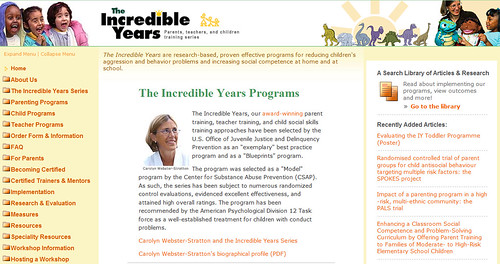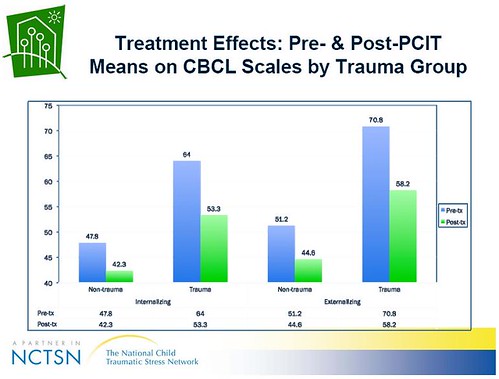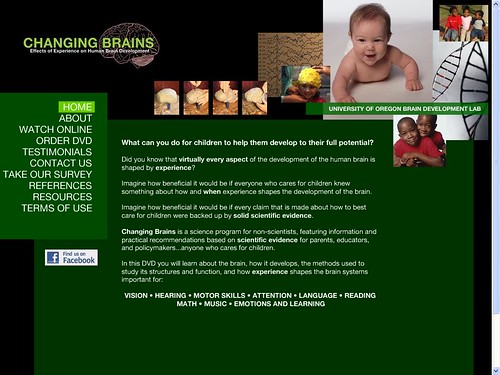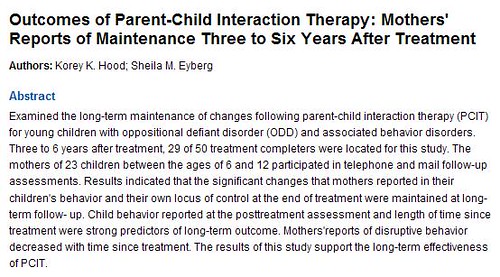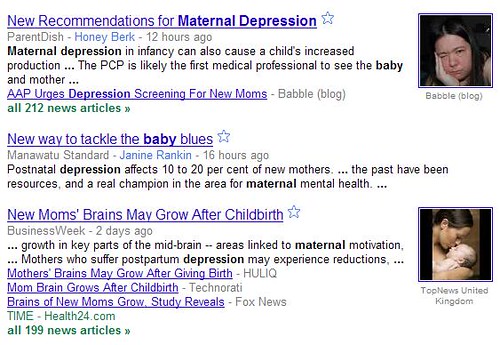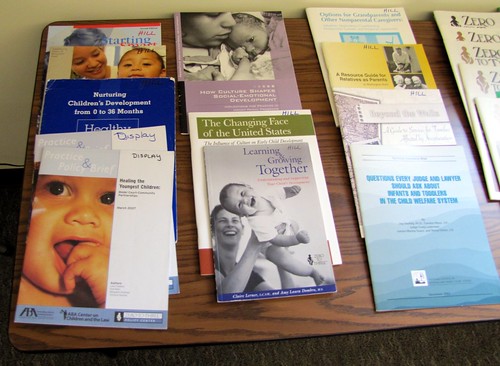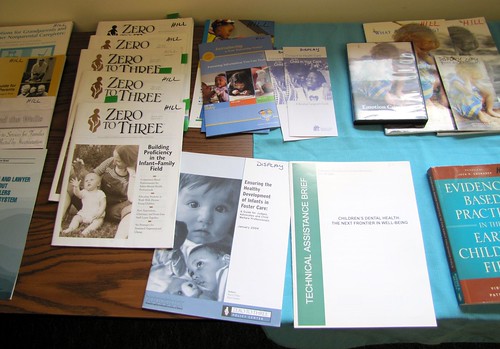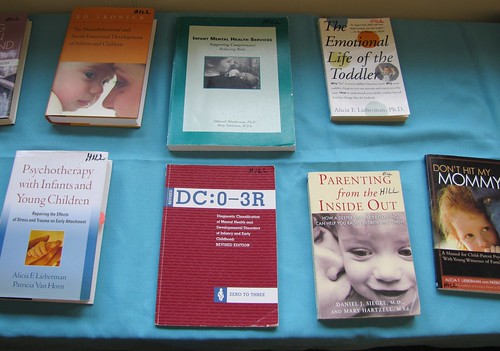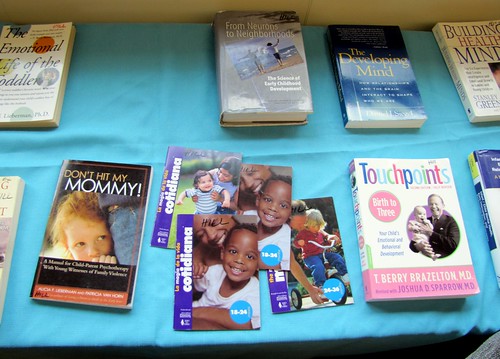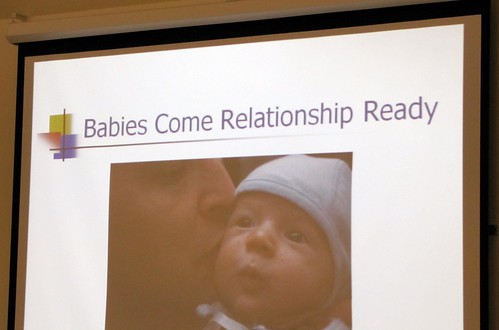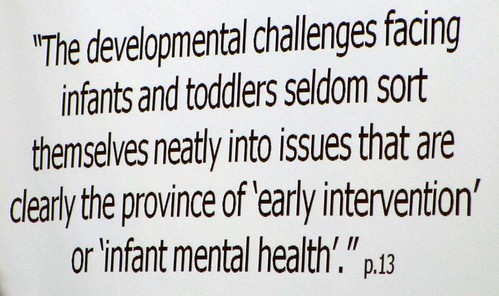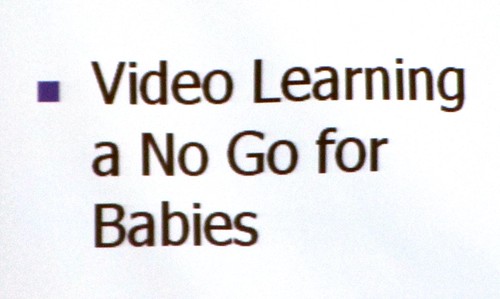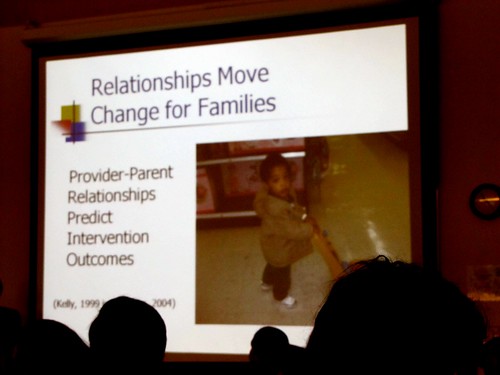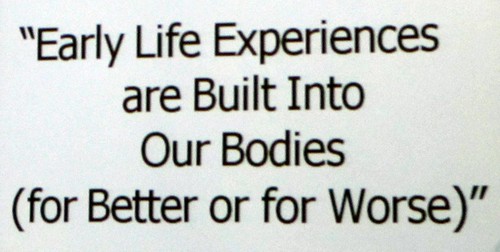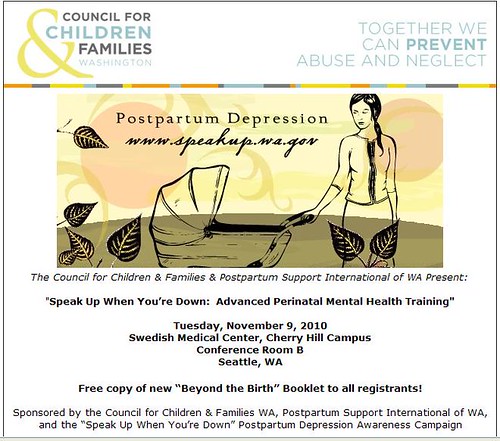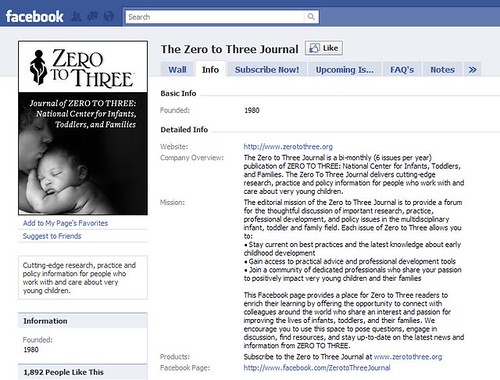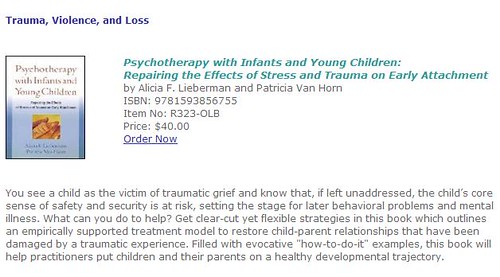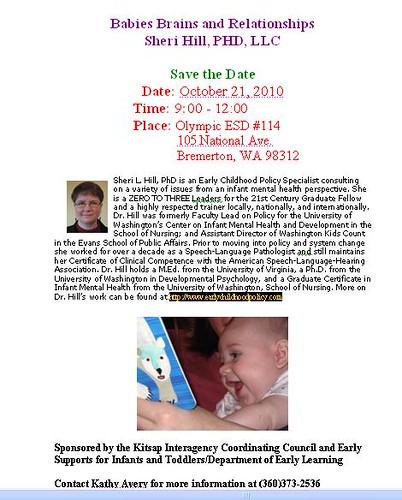The experience of providing INFANT and EARLY CHILDHOOD MENTAL HEALTH consultation, from the perspective of providers on the Kitsap and Olympic peninsulas of Washington State
Monday, December 27, 2010
On Infant and Toddler Mental Health: Convenient, affordable and relevant continuing education delivered via CD-ROM
Friday, December 24, 2010
On the Effectiveness of PCIT for Families of Children on the Autism Spectrum: The role of shared positive affect
J Autism Dev Disord. 2008 Oct;38(9):1767-76. Epub 2008 Apr 10.Solomon M, Ono M, Timmer S, Goodlin-Jones B.marjorie.solomon@ucdmc.ucdavis.edu
Department of Psychiatry & Behavioral Sciences, University of California, Davis, 2825 50th Street, Sacramento, CA 95817, USA.
+Abstract
We report the results of a pilot trial of an evidence-based treatment-Parent-Child Interaction Therapy (PCIT; Eyberg et al. Psychopharmacology Bulletin, 31(1), 83-91, 1995) for boys aged 5-12 with high functioning autism spectrum disorders and clinically significant behavioral problems. The study also included an investigation of the role of shared positive affect during the course of therapy on child and parent outcomes. The intervention group showed reductions in parent perceptions of child problem behaviors and child atypicality, as well as an increase in child adaptability. Shared positive affect in parent child dyads and parent positive affect increased between the initial and final phases of the therapy. Parent positive affect after the first phase was related to perceptions of improvement in problem behaviors and adaptive functioning.PMID: 18401693 [PubMed - indexed for MEDLINE]
Sunday, December 19, 2010
On the Incredible Years Parenting Program: Implementation in ECE, primary care settings, and informal child care
Building a Continuum of Early Childhood Social Emotional Programs, Services & Supports in Adams CountyAccomplishments & Outcomes. Our community has experienced great benefit from integrating social emotional work into the early learning and health domains, and was surprised to realize the importance of considering the multiple ways in which early childhood settings – and the variety of their approaches to promoting social emotional growth and development – can satisfy the goals laid out in the Early Childhood Colorado Framework. This resulted in better clarity of purpose at the community level, as well as opportunities to maximize local resources without compromising the unique nature of the many different types of early childhood service providers, including ECE, primary care settings, informal child care and others.
- 100% implementation of the Incredible Years in all Colorado Preschool Program and Head Start classrooms in the county – 2,600 children.
- Implementation of the Incredible Years in 25 Kindergarten classrooms in three districts.
- Six cohorts of the 14-week Incredible Years Parenting Series annually.
- A combination of CSEFEL training and Early Childhood Mental Health Consultation in all child care centers and family child care homes who, for infrastructure reasons, cannot implement the Incredible Years.
+
+
+
Tuesday, December 14, 2010
On We're Meeting in December: Can't wait until 2011
Friday, December 10, 2010
On Parent Child Interaction Therapy as Effective for Post Traumatic Stress: Reduces child anxiety
..when the parent-child relationship is enhanced and is less coercive/violent/rejecting, children's anxiety goes down (and remember, PTS [Post Traumatic Stress] is a type of anxiety) as well as their behavior improves. This suggests that when externalizing behavior problems, violence and/or serious parent/child relationship problems are present even though the child has clinical PTS, try triaging to start with PCIT [Parent Child Interaction Therapy] or AF-CBT [Alternatives for Families Cognitive-Behavioral Therapy] since this interventions will address more than just the PTS sx. If the child still has PTS after PCIT or AF-CBT, then TF [Trauma-Focused Cogntive Behavior Therapy] may be warranted.
A prescription for treatment from Lucy Berliner at Harborview, based on research from the University of California at Davis. -gw
On Heal Thyself, Washington: Evidence-based help at heal-wa.org
Information about setting up your UW NetID and passwordSome resources on HEAL-WA (indicated by a lock) are governed by license agreements that limit by whom these resources can be used.
Access to these resources is provided via a UW NetID and password, and is limited to members of the following groups of health care professionals who are licensed to practice in Washington State: Chiropractors, East Asian Medicine Practitioners, Massage Therapists, Mental Health Counselors, Naturopathic Physicians, Optometrists, Osteopathic Physicians and Osteopathic Physician Assistants, Physicians and Physician Assistants, Podiatrists, Psychologists, Registered Nurses, and Social Workers. ARNPs - your eligibility is through your RN license.
Monday, December 6, 2010
On U of W Website Calls Attention to the Power of Videotaping Homevisits: A vehicle for self-reflection
One technique the infant mental health specialists learn is to videotape mothers and babies during home visits and review the playback side-by-side with the parent. They comment on positive moments and wonder with the parent about other moments that may not be going so well. What was going on when the infant grimaced and gurgled? When he was reaching for mom? Did she know he wanted her – only her, no one else in the room? “We ask questions about what’s going on, so parents can come to their own conclusions,” says Spieker. “It’s not, ‘Here’s what you did wrong’ or ‘Here’s what you should do.’ It’s a vehicle for self-reflection.”
The goal is to reframe parents’ ideas about child-rearing. “We help parents reflect on a baby’s needs, cues, and symbols, to help them see that: ‘This baby is in distress. He’s a little helpless baby and he really needs me. And this is how he lets me know,’ ” says Spieker.
Decades of research into infant attachment consistently show that babies thrive mentally, socially and emotionally in direct relation to a parent’s responsiveness and sensitivity. Low levels of parental sensitivity -- in particular lack of comfort for infants in distress -- are linked to insecurity and aggression in school-age children. Long-range studies suggest those aggressive tendencies can impact social functioning, academic achievement, and relationships with teachers and friends
Monday, November 22, 2010
On Changing Brains: Of babies and our own
Wednesday, November 17, 2010
On Is It "Birth TO Five" or "Birth THROUGH Five"? Help for kids at the upper end of early childhood

+
+
Bachelor of Science in Education in Birth Through Five - The B.S.E. major in Birth Through Five (B-5) prepares teachers and other early care and education professionals to work in varied settings with young children and their families from infancy through Kindergarten age, including children who are typically developing and those with disabilities.
+
+
The following six steps are essential to the process of PBS.
- Building a Behavior Support Team-PBS begins by developing a team of the key stakeholders or individuals who are most involved in the child’s life. This team should include the family and early educator, but also may include friends, other family members, therapists, and other instructional or administrative personnel.
- Person-Centered Planning-Person-centered planning provides a process for bringing the team together to discuss their vision and dreams for the child. Person-centered planning is a strength-based process that is a celebration of the child and a mechanism of establishing the commitment of the team members to supporting the child and family.
- Functional Behavioral Assessment-Functional assessment is a process for determining the function of the child’s problem behavior. Functional Assessment or Functional Behavioral Assessment (FBA) involves the collection of data, observations, and information to develop a clear understanding of the relationship of events and circumstances that trigger and maintain problem behavior.
- Hypothesis Development-The functional assessment process is completed with the development of a behavior hypothesis statement. The behavior hypothesis statements summarize what is known about triggers, behaviors, and maintaining consequences and offers an informed guess about the purpose of the problem behavior.
- Behavior Support Plan Development-Once behavior hypotheses statements are developed to summarize the data gathered from the functional assessment process, the team can develop a behavior support plan. Essential components of the behavior support plan are prevention strategies, the instruction of replacement skills, new ways to respond to problem behavior, and lifestyle outcome goals.
- Monitoring Outcomes-The effectiveness of the behavior support plan must be monitored. This monitoring includes measurement of changes in problem behavior and the achievement of new skills and lifestyle outcomes.
Thursday, November 11, 2010
On Head Start Looks to the U of W To Help It Improve : To the tune of $40 million
The University of Washington landed a key role in the national effort to revamp Head Start, winning a $40-million grant to lead work to improve teaching and learning within the federal program.
Using the DC 0-3 with Donna Weston: 2nd installment
Friday, November 5, 2010
On Keeping it Fresh: The complete set of "Babies, Brains & Relationships" photos & videos for periodic review
On Current Job Openings for Therapists: Experience in infant mental health preferred

Provides mental health services to children, adolescents, and families with serious developmental, emotional, and behavioral problems in a manner which results in improvements in the child and family's functioning in multiple life domains and is cost effective. Preference will go to Spanish speaking candidates as well as those with infant mental health experience.
Monday, November 1, 2010
On Using the Internet to Keep Abreast: Staying alert and keeping up
Thursday, October 28, 2010
On But Is It Lasting: Long-term effectiveness of PCIT

Monday, October 25, 2010
On Infant Mental Health Issues in the News: Maternal depression and brain development
Friday, October 22, 2010
On Sheri Hill on "Babies, Brains and Relationships": Some take-away messages
Thursday, October 21, 2010
On a Postpartum Depression Awareness Campaign Training: Speak up when you're down
Subject: "Speak Up" & Join Us for a Training on Postpartum Depression
- To increase public awareness about pregnancy and postpartum mood disorders (PPMD), and their impact on the well-being of the entire family system
- To educate professionals in current and effective treatments for PPMD
- To establish for practitioners a standard of care for better screening and treatment of PPMD
- To gain public perspective and insight on effective outreach activities to enhance our state's public awareness efforts to reach families with information on postpartum depression
7:30 - 8:30 Registration and Breakfast (provided)
Campaign meeting to provide input on the future of postpartum depression awareness in WA: (free, but RSVP at info@ccf.wa.gov )
More information, visit www.ppmdsupport.com or www.ccf.wa.gov
On Working With Children Zero to Three Is So Hopeful: Heart-felt comments
Thursday, October 7, 2010
On Video Clips of Donna Weston's DC: 0-3 Presentation: Stay informed and in touch
Thursday, September 23, 2010
On First Photos: Catching the flavor of Donna Weston's DC 0-3 training
Monday, September 13, 2010
On My Two Cents: Drs continue to prescribe inappropriate medications to young children

OPELOUSAS, La. — At 18 months, Kyle Warren started taking a daily antipsychotic drug on the orders of a pediatrician trying to quell the boy’s severe temper tantrums
It’s time to put a stop to this out-of-control prescription of atypical antipsychotics off-label. The American Academic of Child and Adolescent Psychiatry apparently agrees:
Dr. Lawrence L. Greenhill, president of the American Academy of Child and Adolescent Psychiatry, concerned about the lack of research, has recommended a national registry to track preschoolers on antipsychotic drugs for the next 10 years. “Psychotherapy is the key to the treatment of preschool children with severe mental disorders, and antipsychotics are adjunctive therapy — not the other way around,” he said.
So why do doctors continue to prescribe clearly inappropriate medications to younger and younger children? Costs and time. Medication is cheaper than psychotherapy in most cases. And psychotherapeutic interventions require a time and commitment on the family’s part to embrace change. Changing the family dynamics, changing the nature and quality of the parenting relationships, and changing how a parent copes with stress and the behavior of their child. Many parents fear a therapist will also be more judgmental — telling them that their parenting styles may have led to the child’s current problematic behavior. Some parents just aren’t able to hear that (even if therapists are usually far more tactful than looking to place blame — therapy is about helping produce beneficial changes, not blame).
Thursday, August 19, 2010
On Mental Repair: Funny photo

Adapted from You Can Beat Depression: A Guide to Prevention and Recovery (Fourth Edition),, by Dr. John Preston. Available at online and local bookstores or directly from Impact Publishers, Inc., PO Box 6016, Atascadero, CA 93423-6016, http://www.bibliotherapy.com/
Part of my job as a Licensed Mental Health Counselor is to address "stinkin' thinkin'" -- destructive thoughts or cognitive distortions -- that people have, especially parents. My photographer friend Jamie (who is a REAL photographer, not like the rest of us wannabees on Flickr) thinks this shot should go on my business card. OK. -gw
This from my personal blog. -gw
Monday, August 9, 2010
On Come Consult With Us: Each 3rd Friday of the month
Come join us...
Our next consultation group will be Friday August 20th from 4 to 6 p.m. Please join us if you can. It's in Room 105 in the Department of Child and Family at Kitsap Mental Health in Bremerton.
What's our consultation like? Here's a brief snippet from last month's consult bringing up a topic of concern.
What got our consult group going? A conference last March 26th. -gw
On Keeping Up With Resources: Zero to Three on Facebook
Order your issue now!
THIS ISSUE AND WHY IT MATTERS
Public interest in home visiting is on the rise due to the large increase in federal funding for high quality, evidence-based home visitation to be provided through the passage of the Patient Protection and Affordable Care Act signed into law on March 23, 2010. With this legislation, the federal government is making an unprecedented investment in home visiting programs that provide services to young children and their families. The law established a 5-year, $1.5 billion federal grant program for programs serving high-risk children and families, such as those in low-income families, pregnant women less than 21 years old, families with histories of abuse and neglect or substance abuse, children with developmental delays, and families in the military.
The emphasis on evidence-based programs mirrors the push over the past decade for more rigorous program evaluation demonstrating home visiting’s effectiveness. In the 1990s, home visiting was not well understood or accepted as a valuable strategy for delivering services. Funding was in short supply and program evaluations showed mixed results. The contributors to this issue of Zero to Three describe how the landscape for home visiting has changed over the last decade, with greater collaboration among national home visiting models and more rigorous evaluation leading to a better understanding of the key factors that can make programs successful. Learning how the characteristics of home visits—such as the dosage (frequency and duration), the content, and the quality of the relationships between home visitors and families—have an impact on program outcomes is helping researchers and practitioners look more deeply into the complexity of home visitation services.
An existing challenge is how to coordinate home visiting with other child and family services to provide a continuum of care, beginning during pregnancy and throughout the earliest years of life. In addition, the expansion and integration of home visiting services calls for welldeveloped systems and tools for collecting and sharing information and for the rigorous evaluation efforts that will ultimately lead to improved services and maximum benefits for young children and their families. The articles in this issue of Zero to Three provide a rich and thoughtful examination of the growth of the field of home visiting and the potential for the years to come.
Stefanie Powers, Editor
spowers@zerotothree.org
On Repairing the Effects of Trauma: Relationship-based treatment
On a Job Opening: Infant Toddler Director position to be filled
Infant Toddler Program Director
Job Requirements: Minimum of a BA or BS in a related field; Masters preferred. Knowledge of early intervention preferred. Strong supervisory, leadership and interdisciplinary team management skills required. Candidates should be experienced working with infants and young children; and have knowledge of IDEA/Part B and C regulations. Wage is depended on level of experience and education.
HRC application required.
EOE/AA
On Practitioner Preparation to Use the DC: 0-3 R: Donna Weston to give 2-day training in September

Ft Worden in September
The Peninsula Regional Support Network presents…. |
+
Assessment of Infants and Toddlers within a Family Context: Practitioner Preparation to Use the DC: 0-3 R™
DC: 0-3 is published by ZERO TO THREE.
Dates: Day 1 Monday, September 21, 2010 Time: 8:30 a.m. to 4:30 p.m.
AND
Day 2 Tuesday, September 22, 2010 Time: 8:30 a.m. to 3:30 p.m.
(Sign in/Hospitality: Begins 8:00 a.m. on each day.)
Location: Fort Worden-John F. Kennedy Hall—Port Towsend
Audience: Mental health clinicians and supervisors, infant mental health specialists, social workers, psychologists, therapists, pediatricians, nurses, and other professionals interested in the use of the DC: 0-3 R™.
Content: DC: 0-3 R™ responds to the needs for a diagnostic system that accounts for the unique developmental and relational needs of infants/toddlers in the context of their families. This 2 day intensive workshop for mental health clinicians, supervisors and other therapists addresses: the axes and diagnostic classifications used in DC: 0-3 R™; assessment, evaluation and diagnosis of very young children; and use of crosswalks between ZERO TO THREE’s DC: 0-3 R™ and DSM-IV and ICD-9 or 10. This in-depth training will use lecture, video, case presentation and discussion. Participants will discuss the unique developmental needs of very young children and apply clinical reasoning in developing diagnoses using clinical videotaping or printed case examples.
Presenter: Donna R. Weston, Ph.D., Developmental Psychologist, Licensed Psychologist, and infant mental health clinician with over 25 years of experience, and a member of ZERO TO THREE’s DC: 0-3 Task Force and Training Task Force. Dr. Weston is also in the Department of Psychiatry and Behavioral Sciences at the University of Washington and has a private practice in Seattle, Washington.
Contact: For registration complete attached form and return ASAP as space is limited questions please contact Linda Ward lward@co.kitsap.wa.us 360-337-4604 phone 360-337-5721 fax
Tuesday, July 13, 2010
On Meeting and Blogging to Promote ECMH in the Peninsulas: Thinking creatively
Our group and this blog are attempts to creatively expand awareness of the importance of the work of early childhood mental health consultation.
Give us the benefit of your knowledge and experience. Come share your stories. Bring your cases. Let us consult together so we can be more effective in our work. And spread the word.
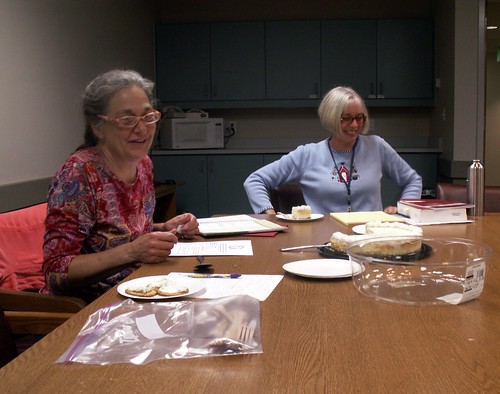
On the Story of the Kitsap Infant Mental Health Coalition: A predecessor
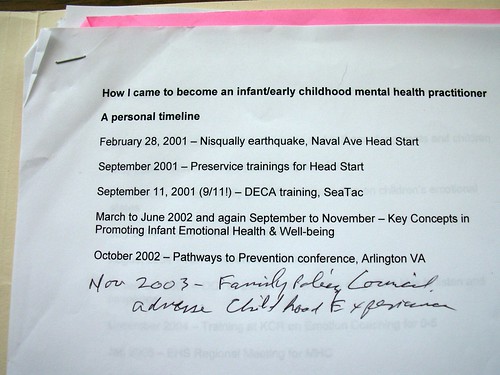
Above is the beginnings of my personal timeline of how I came to this field. Below is a collective history of the "early days" of the arrival an awareness of early childhood mental health in Kitsap County. What are the milestones along the way for you? Tell us your story. We would love to repost it here on this blog. -gw
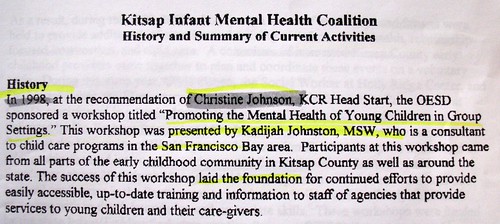
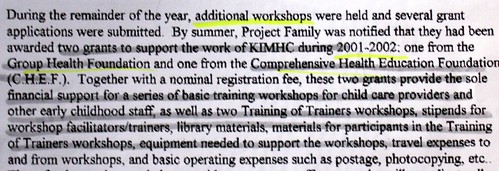
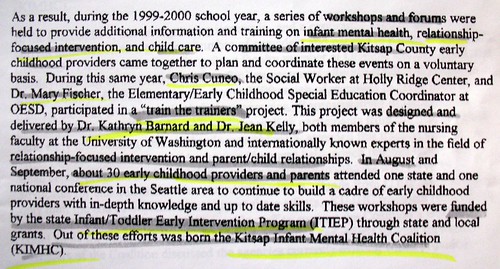
On Babies, Brains and Relationships: Sheri Hill is coming to the Peninsulas
Thursday, July 8, 2010
On Summer Reading: Zero to Three has some suggestions
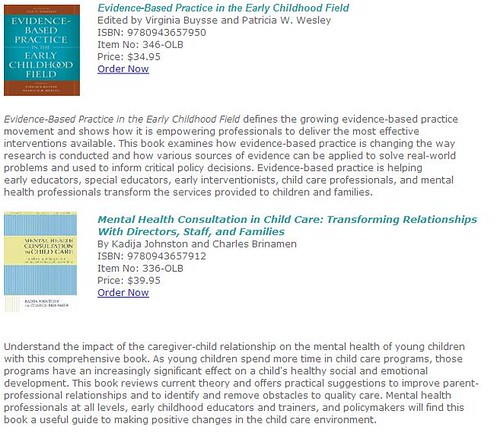
ZERO TO THREE: National Center for Infants, Toddlers, and Families 2000 M St. NW Suite 200
Washington, DC 20036 (800) 899-4301 (703) 661-1500
Email customer service: 0to3@presswarehouse.com
Tuesday, June 22, 2010
On a New Blog Is Born: Promoting early childhood mental health consultation
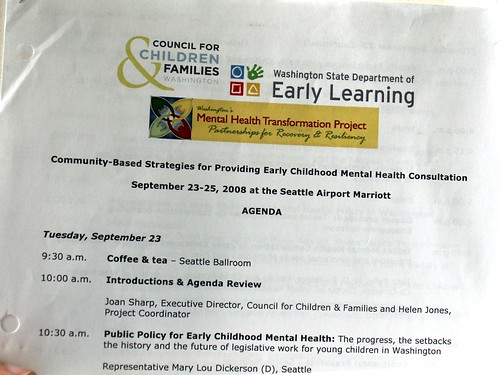
and these goals and strategies...
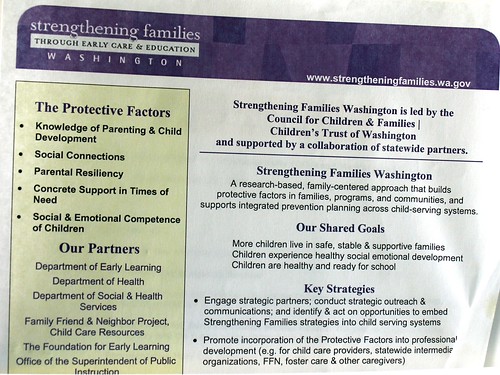
A new blog is launched dedicated to the experience of providing early childhood mental health consultation, from the perspective of providers on the Kitsap and Olympic Peninsulas of Washington State. Here is a photographic retrospective of some of the activities of the group and its members since the launching of the initiative. -gwd
Our Peninsulas ECMC Consultation Group
The Peninsulas' Early Childhood Mental Health Conference Photos
Naomi Perry on Parent Child Interacton Therapy
Charlie Huffine on Diagnostic Coding
Christy Kimpo on Infant Mental Health Classifications
Trauma-Focused Cognitive Behavior Therapy Conference
Cognitive Behavior Therapy Plus Conference
The Peninsulas' Early Childhood Mental Health Conference Presentatons
The view from my office

